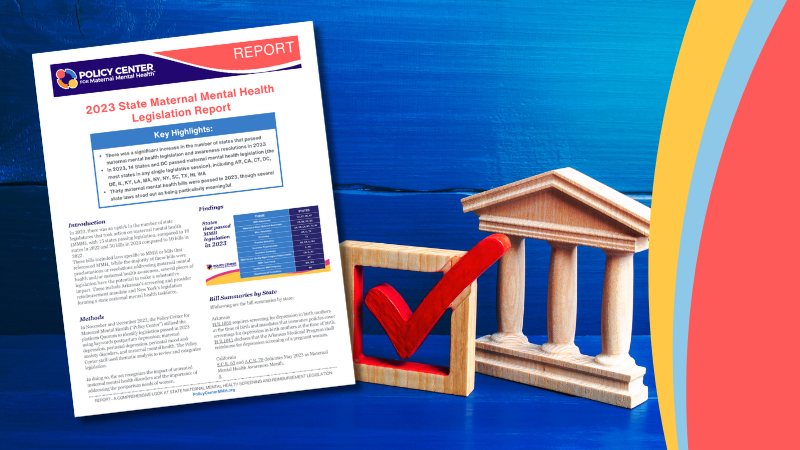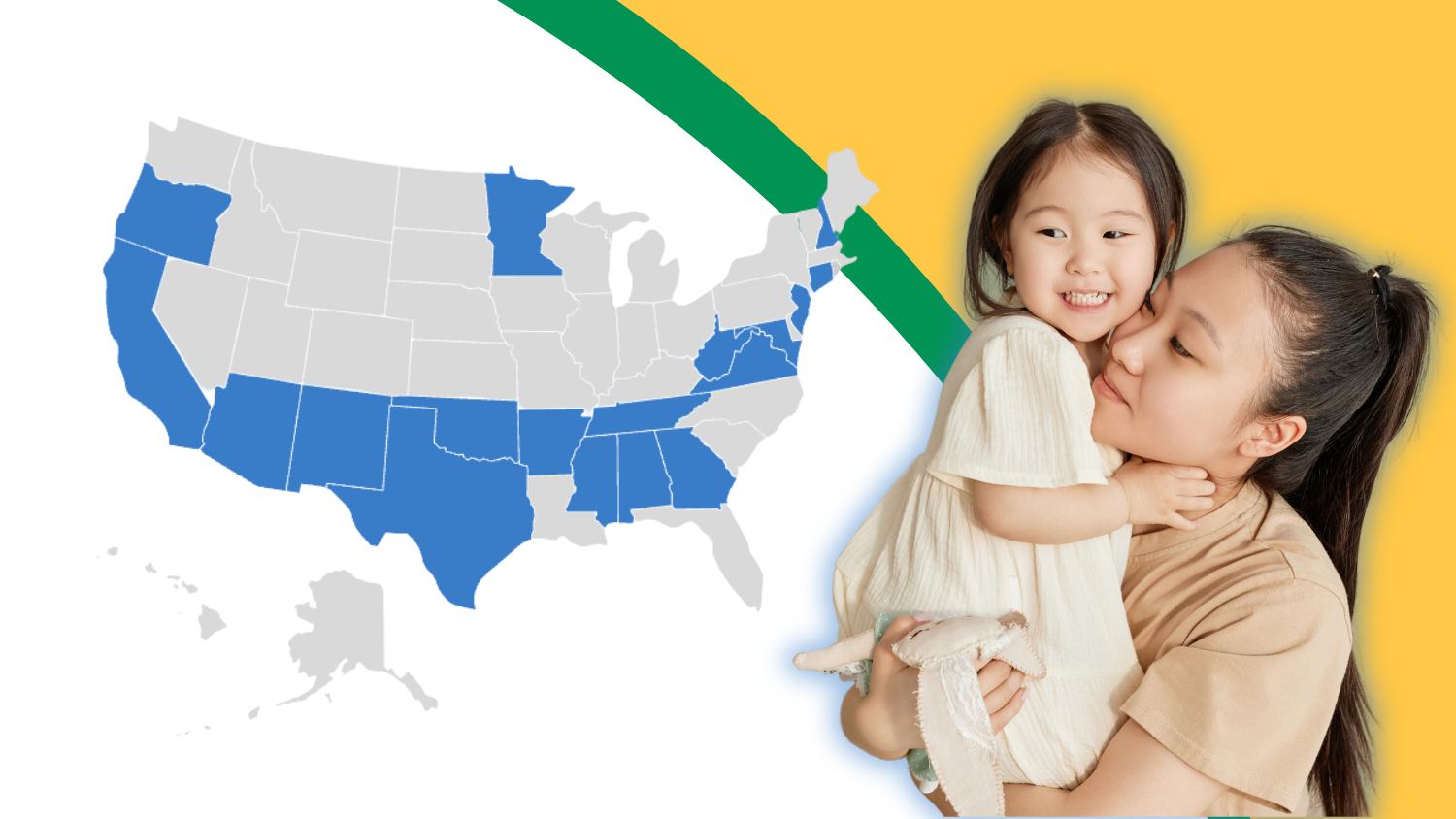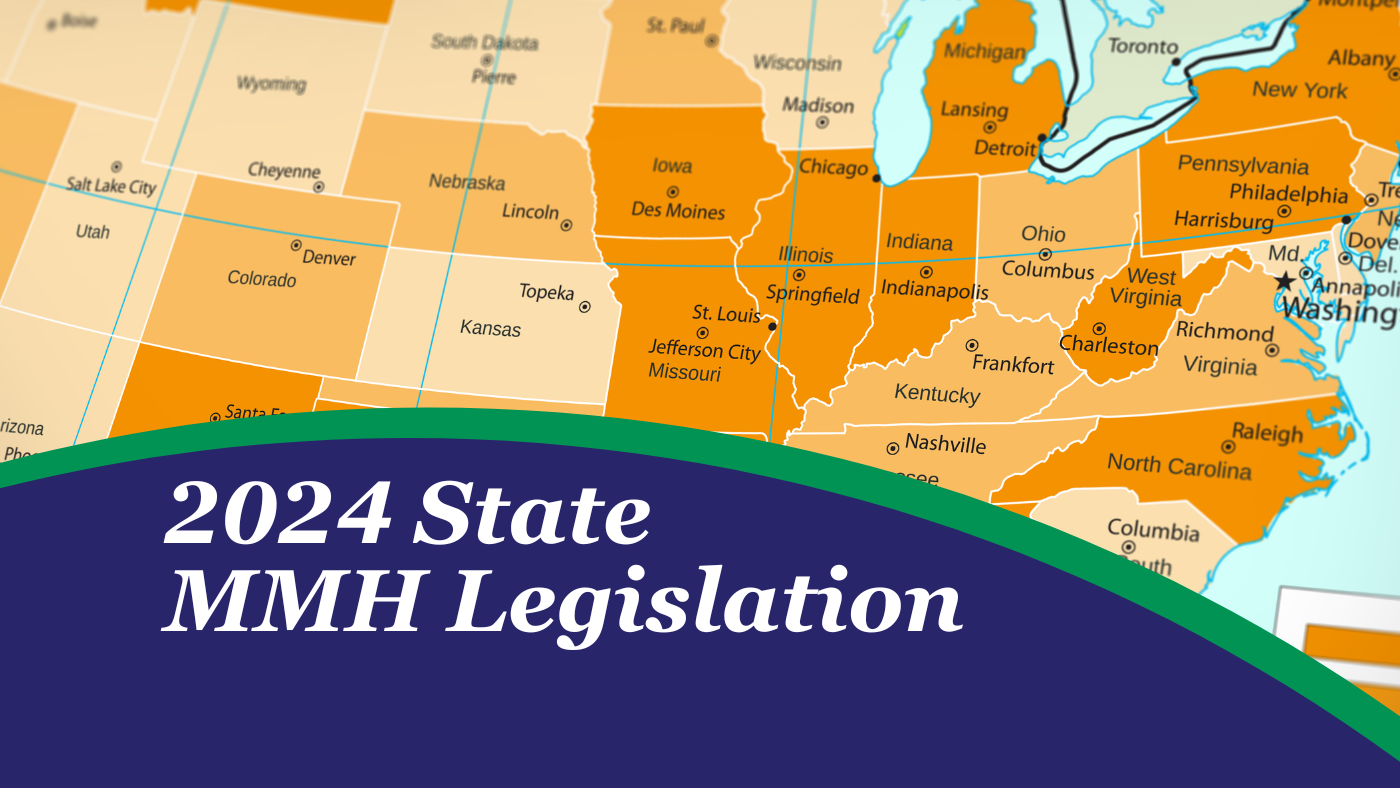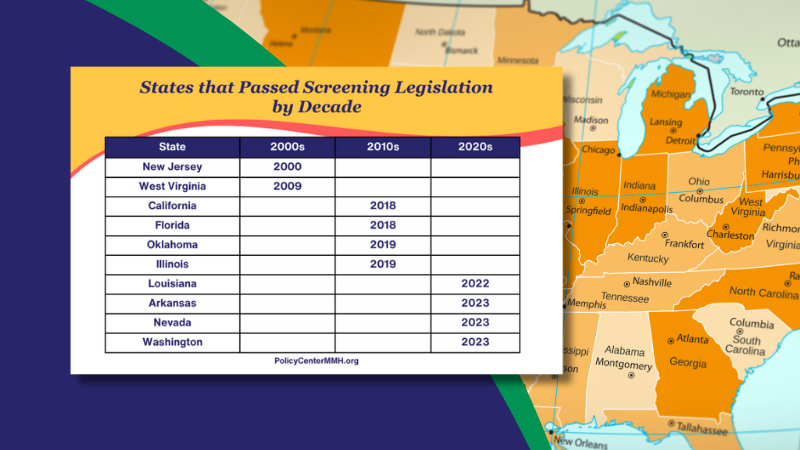15 States Pass 30 Maternal Mental Health Laws
Correction:
The editorial team made two corrections to this report and republished it on March 28, 2024. First, we removed IL HB 2089. Though this bill addresses mental health during pregnancy and postpartum, this bill is a mental health parity bill, not otherwise addressing maternal mental health. Additionally, the KY bill, SB 135, was moved to a new “Other” category in the chart, as though this bill addresses quality outcomes, the requirement is related to the state’s “Cabinet for State and Family Services,” not insurer quality management programs. The “MMH Insurer Quality Management Program Requirements” section was deleted, as no states passed laws in 2023 addressing such programs.
Introduction
In 2023, there was an uptick in the number of state legislatures that took action on maternal mental health (MMH), with 15 states passing legislation, compared to 10 states in 2022 and 30 bills in 2023 compared to 10 bills in 2022.
These bills included laws specific to MMH or bills that referenced MMH. While the majority of these bills were proclamations or resolutions addressing maternal mental health and/or maternal health awareness, several pieces of legislation have the potential to make a substantive impact. These include Arkansas’s screening and provider reimbursement mandate and New York’s legislation forming a state maternal mental health taskforce.
Methods
In November and December 2023, the Policy Center for Maternal Mental Health (“Policy Center”) utilized the platform Quorum to identify legislation passed in 2023 using keywords postpartum depression, maternal depression, perinatal depression, perinatal mood and anxiety disorders, and maternal mental health. The Policy Center staff used thematic analysis to review and categorize legislation.
Findings
The chart below highlights the topics each state’s bill(s) address.
Table 1:
States that passed MMH legislation in 2023
| THEME | STATES |
| MMH Awareness | CA, CT, DE, NY |
| Maternal or Black Maternal Awareness | CE, DE, DC, SC |
| Misc. Resolution | CA, DE, LA, NY, TX, HI |
| Screening | AR, IL, TX |
| Provider Education | TX |
| Insurance Requirements | AR, WA |
| Insurance Coverage | NV |
| MMH Task Force | NY |
| Funding for MMH Programs | MA, WA |
| Department of Corrections | NV |
| Other Category | KY |
Following are the bill summaries by state:
Arkansas
H.B.1035 requires screening for depression in birth mothers at the time of birth and mandates that insurance policies cover screenings for depression in birth mothers at the time of birth.
H.B.1011 declares that the Arkansas Medicaid Program shall reimburse for depression screening of a pregnant woman.
California
S.C.R. 63 and A.C.R. 70 dedicates May 2023 as Maternal Mental Health Awareness Month.
A.C.R. 2 proclaims January 23, 2023 as Maternal Health Awareness Day. In doing so, the act recognizes the impact of untreated maternal mental health disorders and the importance of addressing the postpartum needs of women, including mental health screening.
S.C.R.86 proclaims August 2023 as Breastfeeding Awareness Month in California. Among other things, this measure brings awareness to the fact that mothers who breastfeed have a decreased risk of postpartum depression.
H.R.36 declares June each year as Fatherhood Well-being Month. This act raises awareness of the positive impact that involved fathers have on their families, including lowering the risk of postpartum depression among mothers.
Connecticut
H.B. 6835 proclaims the month of May each year to be Maternal Mental Health Month and May 5th of each year to be Maternal Mental Health Day. These actions raise awareness of issues surrounding maternal mental health.
Delaware
S.C.R. 44 recognizes May 5, 2023, as Maternal Mental Health Awareness Day
H.C.R. 3 designates January 23, 2023, as Maternal Health Awareness Day and recognizes maternal mental health.
S.C.R. 87 proclaims the month of October 2023 as Depression Awareness Month. In bringing awareness to various forms of depression and their prevalence, the bill names postpartum depression.
District of Columbia
CER25-0053 declares April 11th to April 17th as Black Maternal Health Week in the District of Columbia. In doing so, this resolution recognizes that Black mothers experience a higher prevalence of perinatal mental health issues, including postpartum depression. Moreover, the District has launched the Perinatal Mental Health Task Force to study and make recommendations on improvements to mental health programs, treatments, and methods to close gaps in care provision and coordination in the weeks before and after birth.
Illinois
S.B.0067, S.B.1298, H.B.1384, and H.B.2289 establish that, on or after July 1, 2022, individuals who are otherwise eligible for medical assistance under this Article shall receive coverage for perinatal depression screenings for the 12-month period beginning on the last day of their pregnancy.
H.B. 2089 addresses the regulation of various measures in Illinois, including the insurance coverage of mental health care during pregnancy and post-pregnancy.
Kentucky
S.B.135 requires the Cabinet for Health and Family Services to make information on postpartum depression and a postpartum assessment tool available on its website. Furthermore, the act requires the Cabinet for Health and Family Services to develop and implement a collaborative program aimed at improving the quality of prevention and treatment of postpartum depression.
Louisiana
S.R.136 encourages mental healthcare providers and healthcare providers who provide care to pregnant and postpartum women to attend continuing education courses on perinatal mental health care and brings awareness to the prevalence of perinatal mood disorders among pregnant and postpartum women.
Massachusetts
H.4040 dedicates $860,000 in 2024 for the Department of Public Health to fund postpartum depression programs at community health centers in 6 cities. It also dedicates $675,000 to address maternal mental health, expanding support to pregnant and postpartum individuals by adding substance use disorder-specific resources.
Nevada
S.B.232 requires the State Plan for Medicaid to include coverage for postpartum care services, including mental health screenings and treatment for postpartum depression, for a certain period of time following a pregnancy.
A.B.292 mandates the Department of Corrections to establish specific regulations for the care of female inmates. It requires institution wardens or facility managers to implement policies concerning the care of pregnant and postpartum offenders. Such policies include providing trauma-informed care and unlimited postpartum depression treatment to pregnant and postpartum inmates.
New York
K. 371 proclaims May 1-5, 2023, as Maternal Health Awareness Week
J. 296 memorializes Governor Kathy Hochul to proclaim January 23, 2023, as Maternal Health Awareness Day. The act includes recognition of the importance of maternal mental health.
J. 144 memorializes Governor Kathy Hochul to proclaim May 3-9, 2023, Maternal Health Awareness Week. In doing so, the act recognizes the significance of maternal mental health.
K.450 memorializes Governor Kathy Hochul by proclaiming May 2023 as Maternal Depression Awareness Month in New York. In doing so, the resolution will increase public awareness of the frequency and types of postpartum depression.
J.830 Commemorates the 25th Anniversary of the Postpartum Resource Center of New York, which brings awareness to perinatal mood disorders, including perinatal depression.
S.4007C and R.555 direct the commissioner of mental health to establish a maternal mental health workgroup to study and issue recommendations related to maternal mental health and perinatal and postpartum mood and anxiety disorders.
South Carolina
H.R. 4265 recognizes April 11 through April 17, 2023, as “Black Maternal Health Week.” In doing so, the measure recognizes the disparities and burden of untreated maternal mental health disorders on Black birthing people.
Texas
H.B. 1, the General Appropriations Act, dedicates $3.5 million towards supporting maternal mortality and morbidity resources, including identifying or creating a risk assessment tool to identify pregnant women at a higher risk for poor postpartum outcomes and training providers on how to use the tool. The act allocates a portion of the funding to collect information on postpartum depression screening and treatment under state health programs annually.
H.R. 593 and S.R. 350 recognize September 23, 2023, as Fourth Trimester Care Day in Texas. The measure acknowledges that the month after giving birth is a transition period where the parents need support and screening for their mental and physical well-being.
Hawaii
S.C.R. 94 This resolution urges retail stores and pharmacies doing business in Hawaii to adopt policies on a national and local level to guarantee an individual’s unhindered access to all United States Food and Drug Administration-approved contraceptives. Unintended pregnancy increases the risk of experiencing postpartum depression.
Washington
S.B. 5103 requires ongoing Medicaid payment for maternal depression screening for mothers of children ages birth to six months.
S.B. 5187 allocates $500,000 of the general state fund for each fiscal year 2024 and 2025 toward perinatal support – to provide peer support, resources, and referrals to new and expectant parents and people in the emotional transition to parenthood experiencing or at risk of postpartum depression or other mental health issues.
Discussion
Though more states than ever have passed legislation addressing maternal mental health, few states have passed substantive legislation in 2023. Here are the states with legislation we took particular note of.
Arkansas’s screening mandate also included a companion bill to direct the state’s Medicaid agency to reimburse providers who screen during pregnancy (not just requiring insurers to cover the services for patients). This law is worth highlighting for two reasons: 1)It shows progress in signaling that screening in pregnancy and not just the postpartum period is critical (and in alignment with clinical practice guidelines) and the new HEDIS screening measures, and 2) It addressed reimbursement to providers (presumably obstetric providers such as Ob/Gyns and midwives) which has largely been neglected in state policy conversations. Though there are several barriers to the implementation of screening in these settings, payment to obstetric providers is one that we consider a high priority to address.
Also of note, Massachusetts is the first state to address maternal substance use disorder (SUD) in the context of maternal mental health. We will be watching how this work unfolds closely, as we expect many other state legislatures will also be honing in on maternal SUD.
New York city and the state have made many efforts to address maternal mental health, and in 2023 took substantive action, passing a law to forum a maternal mental health workgroup/task force (a recommendation in our model legislation).
We are eagerly watching to see how Texas’s deep focus on maternal mental health leads to improved outcomes. In 2023, the state earmarked funding “to collect information on postpartum depression screening and treatment under state health programs annually.” We’re curious if these investments help drive improvements in the state’s HEDIS screening rates similar to states that mandate screening (which is recommended in our model legislation).
Washington state also passed a bill addressing ongoing reimbursement to Medicaid providers for maternal depression screening and passed the first law in the nation addressing maternal mental health peer support.
The Policy Center, Ongoing Pulse on State Policy
The Policy Center will continue to promote our model state legislation to support state policymakers in passing strong legislation, providing direct support as needed. See our model legislation here. We also support state non-profits leading maternal mental health policy advocacy through our State Policy Fellows programs.
If you are aware of a maternal mental health law that we missed, please drop us a line at [email protected].



